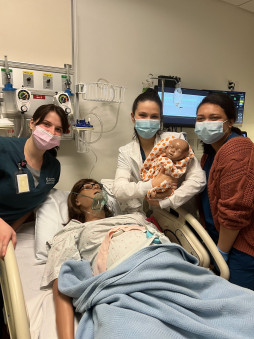
escape room simulation.
MESA, Arizona – April 6, 2022 – When Mesa Community College nursing students go into the simulation lab, it can be quite nerve-racking. During the past year, Interim Nursing Department Chair and Nursing Simulation Coordinator, Diana Breed, who’s been teaching for the past 20 years, noticed students’ anxiety level climbing more than usual.
“They go there to apply the knowledge they learned in the classroom, but students say, ‘They walk in the room and all their thoughts leave their head. They knew it until they walked in the room,’” explains Breed.
Either the students are uncomfortable and anxiety is keeping them from making decisions they would normally make or they don’t have the knowledge as much as they thought they did, she says. So to differentiate between the two, Breed says she and her co-workers tried to eliminate the students’ anxiety by allowing them to be in the room without any evaluation at all.
An article about how escape rooms help develop teamwork and thinking sparked Breed’s curiosity, but she had never been to one herself. So, she gathered a group of coworkers and went to an escape room nearby. “We worked together as a team to come up with the ideas, we were really bad at it,” she says.
Soon after, Breed started work on developing her own nursing escape room scenario. She investigated different types of locks and came up with hints.
One scenario takes students, who work together in a team, through two rooms. In the first room is a man who is dehydrated with food poisoning, but the students don’t know this. Breed and her co-workers, laboratory technician Nancy Sanchez Padilla and simulation technician Shayla Turner, observe the students, behind one-way glass.
“When we turn off the lights, we can see in there, but they can’t see us,” says Breed. “So, we answer for the patients, then tell them what’s going on. We answer the phone if they call the doctor.”
During the simulation, students read the chart, ask the patient questions, find the clues, and give the correct dosage of medication or IV before they can open the locks and find the final key to move to the next room. It’s set up like an escape room with hints along the way, says Breed. In the next room is the patient’s wife, who is ready to have a baby.
The students are applying the knowledge they’ve learned in the classroom, says Breed. They’re not graded, but given a formative evaluation.
Although Breed doesn’t know yet whether the nursing escape room simulation helps decrease anxiety, she’s received positive feedback from participating students.
“I would like students to recognize that whenever you’re doing something, you‘re learning,“ Breed says. “It doesn’t have to be stressful. It can be a fun, exciting thing. It doesn’t have to be sitting down taking a test. The more you build your muscle memory, you’re building a cognitive link. So, you’re doing it in a fun atmosphere and that link will still be there when you need it under a stressful situation as well.”
This is the second semester the nursing escape room is offered. It was implemented in 2019, but soon after the pandemic hit, it was put on hold.
Learn more about the MCC nursing program at mesacc.edu/departments/nursing.
# # #
Media contact: Dawn Zimmer, dawn.zimmer@mesacc.edu or 480-461-7892
Mesa Community College is nationally recognized for university transfer, career and technical programs, civic engagement, service-learning and innovative approaches to education. On average MCC students provide 23,000 hours of community service annually. For more than 50 years, the college has served as a resource for education, workforce development and lifelong learning. Host to more than 25,400 students annually, MCC offers degree and certificate programs at its two campuses and additional locations through a combination of modalities. MCC is transforming how it champions student success through Guided Pathways with Integrated Support Services and a commitment to diversity, equity and inclusion. MCC is a Hispanic Serving Institution with nearly 50% of its students being the first in their families to attend college. MCC has the largest indigenous student population of all the Maricopa Community Colleges; its American Indian Institute serves students from the 22 federally recognized Arizona tribes as well as out-of-state tribes. The diverse student body includes hundreds of international students from around the world. Award-winning faculty are dedicated to student success, providing the education and training that empowers MCC students to attain their goals. Located in the East Valley of Phoenix, Arizona, on the traditional territories of the O'odham, Piipaash and Yavapai Peoples, MCC is one of 10 colleges in the Maricopa County Community College District. Visit mesacc.edu to learn more.
Mesa Community College is accredited by the Higher Learning Commission (HLC) -- hlcommission.org.
The Maricopa County Community College District (MCCCD) is an EEO/AA institution and an equal opportunity employer of protected veterans and individuals with disabilities. All qualified applicants will receive consideration for employment without regard to race, color, religion, sex, sexual orientation, gender identity, age, or national origin. A lack of English language skills will not be a barrier to admission and participation in the career and technical education programs of the District. MCCCD does not discriminate on the basis of race, color, national origin, sex, disability or age in its programs or activities. For Title IX/504 concerns, call the following number to reach the appointed coordinator: (480) 731-8499. For additional information, as well as a listing of all coordinators within the Maricopa College system, visit maricopa.edu/non-discrimination.

